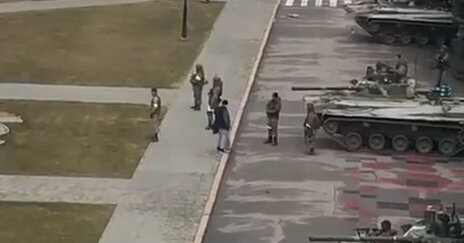ODESSA, Ukraine—Sparks fly day and night at the railyard of Odessa’s tram authority, where men in coveralls are slicing up old steel rails and welding them into barricades called “hedgehogs” to stop Russian tanks.
Not far away, the area around the city’s elegant baroque opera house looks like a set from a World War II movie, with chest-high stacks of sandbags and troops in green uniforms. And a food hall downtown catering to hipsters has been turned into a warehouse for a range of provisions — food, clothing and medicine for the troops.
A major attack on Odessa, which as Ukraine’s biggest port city is crucial for the country’s economy, feels like an inevitability, officials and residents say. Russian naval ships have gathered just outside Ukraine’s territorial waters in the Black Sea and Russian troops are pushing ever closer from the east. This week, Russian rocket attacks hit a village just outside Odessa as well as a radar installation nearby, killing two, the city’s mayor, Gennady Trukhanov, said.
“It’s good that we had a strong wind and fog today because aviation can’t work and the ships can’t land,” said Mr. Trukhanov, who has exchanged his elegant suits for cargo pants as he moves around town inspecting preparations. “Every day they make it seem like today is the day.”
For the first several days of the invasion, Russia primarily concentrated its military forces on Kyiv, in the north, and Ukraine’s second-largest city, Kharkiv, in the northeast. But a concerted and in many ways more successful campaign is being waged in Ukraine’s south, along the coasts of the Black Sea and Sea of Azov, a small, important body of water that Russia seeks to take full control of.
As of Wednesday, Russian forces had nearly captured of two strategically important cities: Mariupol on the Sea of Azov and Kherson at the mouth of the Dnieper River, though Ukrainian officials said their forces were continuing to fight to repel them.
Fighting was particularly intense in Kherson. The Russian military declared that it had captured the city, though Ukrainian officials said that while the city was surrounded the battle for control was continuing. Neither claim could be independently verified.
Kherson’s mayor, Igor Kolykhaev, declared on Facebook that a “humanitarian catastrophe” was unfolding and called on the media to help pressure Russian forces into opening a corridor “to take out the dead and wounded and bring in medicine and food.”
“Without that the city will die,” he said, adding: “We are all waiting for a miracle. We need it.”
Kherson, with a population of around 300,000, is just over 120 miles from Odessa, and Russian troops have already pushed beyond it to Mykolaeva, about 45 miles to the north, Ukrainian officials say.
But it is Odessa that would be the real prize. Founded by Catherine the Great in the late 1700s, the city was a crown jewel of the Russian Empire and a critical commercial port for the Soviet Union. Though not as militarily significant as the Crimean Peninsula, which Russia annexed in 2014, President Vladimir V. Putin of Russia has spoken wistfully about the reconstitution of imperial-era New Russia, a region along the Black Sea that centered on Odessa.
Like the eastern regions of Donetsk and Luhansk, Odessa was the site of a separatist uprising backed by Russia in 2014 that sought to create an independent state. But the effort was crushed after a series of pitched street battles pitting the separatists against Ukrainian nationalists and soccer hooligans, which culminated in the torching of a trade union building on the outskirts of Odessa. At least 40 pro-Russian activists were killed.
Days before the invasion started last week, Mr. Putin issued a threat against those who started the fire, suggesting that Odessa was on his mind.
“The criminals who committed this evil act have not been punished,” he said. “No one is looking for them, but we know them by name.”
Mr. Trukhanov, the Odessa mayor, backed by assessments from Ukraine’s military, said Russia’s goal was likely to surround Odessa with land and naval forces, cutting off Ukraine’s access to the Black Sea, which is the country’s primary link to the global economy.
“My sense is that they will encircle Odessa and hold that position while they continue their assault on Kyiv,” Mr. Trukhanov said. Doing so, he said, “will put an end to cargo shipments, an end to the economy and the end of development.”
He added, “But we’re not talking about that often, because the priority is survival.”


























